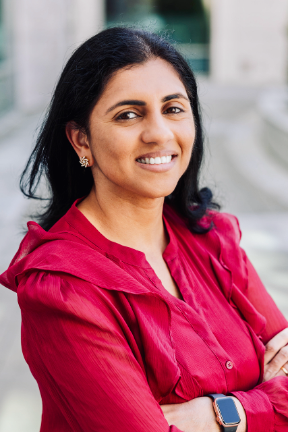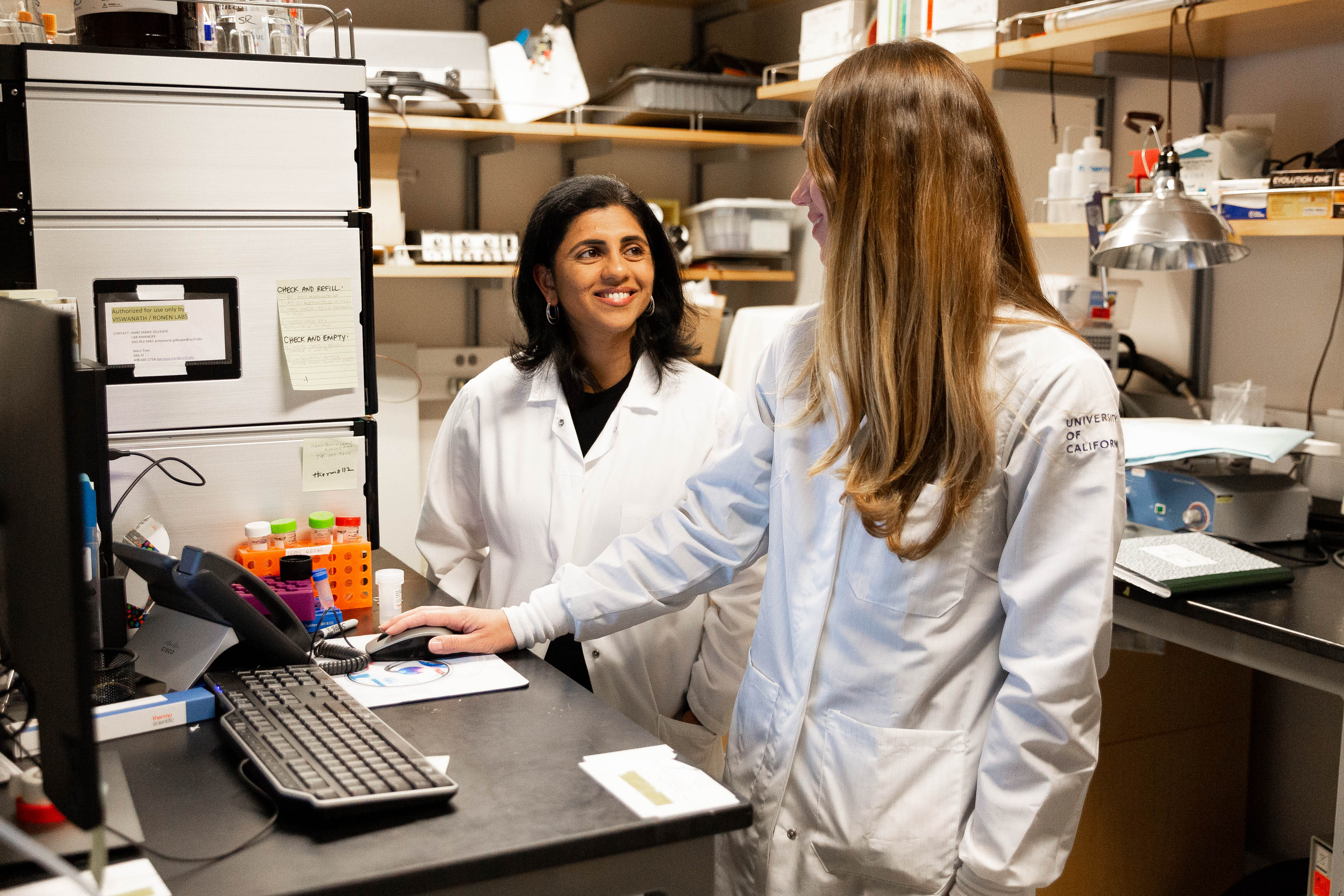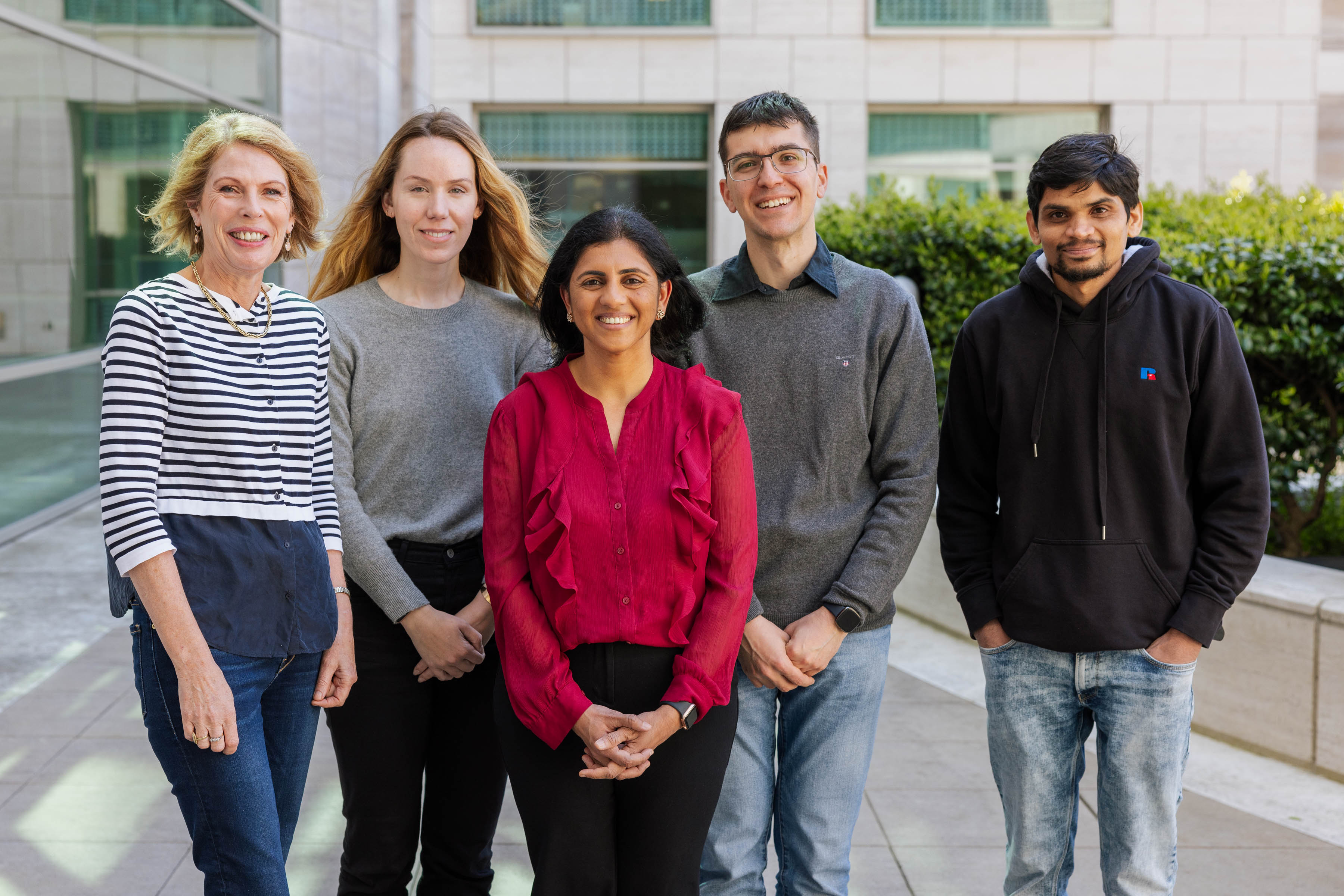Researcher Pavithra Viswanath, PhD, Delivers Science that Makes a Difference
 “I love the science we are doing. I believe it has the potential to make a difference for the patient,” said researcher Pavithra Viswanath, PhD, principal investigator of the Cancer Metabolic Imaging and Therapy Lab and associate professor in the UCSF Department of Radiology and Biomedical Imaging. “At UCSF, we have a fantastic setup to develop novel therapies, and there’s no place better than Radiology to develop metabolic imaging biomarkers.”
“I love the science we are doing. I believe it has the potential to make a difference for the patient,” said researcher Pavithra Viswanath, PhD, principal investigator of the Cancer Metabolic Imaging and Therapy Lab and associate professor in the UCSF Department of Radiology and Biomedical Imaging. “At UCSF, we have a fantastic setup to develop novel therapies, and there’s no place better than Radiology to develop metabolic imaging biomarkers.”
Using Metabolism to Understand Brain Tumors
“We try to understand the metabolism of brain tumors. By understanding this metabolism at different scales, we can come up with therapeutic targets that will help us cure these tumors, and at the same time come up with non-invasive imaging biomarkers that will tell us whether these tumors are responding to the treatments that we develop,” said Viswanath. Her pre-clinical work validates the safety, biodistribution, and efficacy of new therapies and imaging biomarkers over several years.
“When you work in the pre-clinical space, you hope that the work you do makes it to the clinic. Beyond that, you are building a body of knowledge that will be of use to future generations,” said Viswanath.
Radiating with energy and excitement in her office at Byers Hall, just outside of the lab, Viswanath shared news that the UCSF Brain Tumor Center SPORE Project will move from pre-clinical to clinical translation in the next few years.
UCSF Brain Tumor Center SPORE Project: Novel Hyperpolarized C-13 Imaging as Metabolic Markers of Response in IDH-Mutant Glioma
Eight years ago, Viswanath’s work on hyperpolarized C-13 imaging in preclinical low-grade adult brain tumor models showed that hyperpolarized C-13 imaging monitored therapy response in a very specific way that could be exploited for improved treatment. Last year, the project was funded as a UCSF Brain Tumor Center SPORE Project – Specialized Programs of Research Excellence (SPOREs) – designated and funded by the National Cancer Institute to promote translational research focused on an organ-specific human cancer.
Led by Viswanath, imaging scientist Yan Li, PhD, and neuro-oncologist Susan Chang, MD, the goal of this project, Novel Hyperpolarized C-13 Imaging as Metabolic Markers of Response in IDH-Mutant Glioma, is to use hyperpolarized C-13 imaging to monitor the metabolism of IDH mutant gliomas.
“We are thrilled to see the work transition to clinical trials now. It’s really satisfying to see it in the clinic,” said Viswanath. “It’s possible because we have a system here at UCSF – the infrastructure, the pipeline, and the departmental support to make these things happen.”
American Cancer Society and Philanthropic Grants
 In January, Viswanath’s lab received a $250,000 grant for pediatric low-grade glioma research. The one-year pilot project will develop novel immuno-metabolic therapies to target and non-invasively monitor immune cells that surround pediatric low-grade gliomas.
In January, Viswanath’s lab received a $250,000 grant for pediatric low-grade glioma research. The one-year pilot project will develop novel immuno-metabolic therapies to target and non-invasively monitor immune cells that surround pediatric low-grade gliomas.
“It was the fastest grant we’ve ever written,” she said, referring to the 2-page proposal she submitted on Christmas Eve—just two days after receiving the request from the UCSF Brain Tumor Center on behalf of an anonymous donor, and just in time to make it on her family’s vacation. “I’ve got to get this grant out!” she recalled telling her boys, ages 15 and 11, who at the time were understandably anxious to get on their way to Disneyland.
More recently, in April, Viswanath received a call (while on vacation in Kings Canyon National Park!) from the American Cancer Society informing her that she was awarded a Research Scholar Grant. “This award provides us with four years of funding to tailor a novel metabolic imaging technique called deuterium metabolic imaging to specifically detect the IDH mutation in adult low-grade glioma models,” said Viswanath.
A Love of Biology
“I’ve loved biology ever since I was a kid. The simple act of doing an experiment gives me a lot of pleasure,” said Viswanath, who acknowledged it’s surprising, considering she grew up in a family of lawyers and accountants. She remembers being in eighth grade when she read, This is Biology by Ernst Walter Mayr: “It made a deep impression on me, and that’s when I knew I wanted a career in biology,” she said.
After high school, Viswanath completed an integrated PhD program at the prestigious Indian Institute of Science, where she focused on the biochemistry of the malaria parasite. Upon graduating, she joined Astra Zeneca in Bangalore to fulfill her desire to learn how to take a drug to market.
During her six years on the research and development team, Astra Zeneca started an anti-malaria drug discovery program with funding from the Bill and Melinda Gates Foundation. It was the perfect opportunity for Viswanath, who was drawn to work on neglected diseases and considers herself lucky to have learned so much kickstarting the program from molecules in a dish to phase zero trials. However, there was one drawback she witnessed: “When you find something interesting, you can’t do it. It must make business sense for the company,” she said.
This desire for academic freedom led her to UCSF, when she moved with her husband to the Bay Area in 2014. She and her husband met during their PhD programs. “He’s extremely supportive of my work and without him, I’d have given up a long time ago,” she says with a laugh when asked about work-life balance.
In 2014, Viswanath joined Sabrina Ronen’s lab as a specialist. At the time, metabolic imaging was new to her. She learned everything about imaging from the ground up at UCSF and started her lab at UCSF in August of 2020.
 Starting her lab amid the pandemic was one of Viswanath’s biggest challenges and one of her biggest successes. They quickly figured out it was about getting the work done, whether hiring over Zoom, or working in the lab on Saturdays to accommodate staggered schedules. And it set the tone and foundation for the lab’s unique vibe that she loves – wonderful people, with good rapport, working in an open and friendly environment.
Starting her lab amid the pandemic was one of Viswanath’s biggest challenges and one of her biggest successes. They quickly figured out it was about getting the work done, whether hiring over Zoom, or working in the lab on Saturdays to accommodate staggered schedules. And it set the tone and foundation for the lab’s unique vibe that she loves – wonderful people, with good rapport, working in an open and friendly environment.
“In hindsight, everything came together. I always wanted to develop therapies. And when you develop a therapy, you also always need an imaging biomarker to know whether the therapy has worked,” said Viswanath. “Now that I’ve started my own lab, we have an integrated therapy and imaging development program.”
When she’s not at work, Viswanath enjoys keeping up with her family on their annual trips to discover gorgeous hiking trails, mostly recently in Yosemite, Sequoia, and Mount Rainer National Parks. At home with her family, she loves to play board games and admits she is very competitive when challenging her boys and husband to their favorite board games such as Sequence, Catan and Monopoly.
Reflecting on her career, Viswanath’s best advice is, “Hang-on! You can’t always see where you are headed but if you persist, it all works out in the end.” She believes the single biggest factor to success is not talent, but the ability to just hang on and persist, to learn new areas, and adapt to change.
“If I stuck to my comfort zone, I wouldn’t be where I am today,” said Viswanath.
